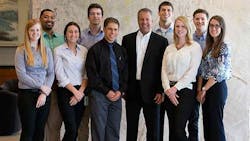Waves of technology have been radically changing what workers do, yet neither the workforce system nor company human resource departments have adequately responded, according to Mark Muro, director of policy for the Metropolitan Policy Program at Brookings.
One sector that needs to react quickly to ensure talent matches technology is the auto sector. Meeting at Kettering University in Michigan, Brookings brought together industry executives, entrepreneurs, educators, training-system officials, and economic development people to discuss developments in “digitization” and explore a variety of training-system responses to the talent needs of industry.
Here are some observations from the meeting:
Software really is changing everything.
-Since 2010, more software and computer jobs than mechanical engineering jobs have been posted in the Michigan manufacturing sector.
-“It says something” that the second largest exhibition booth at the recent Hannover Messe in Germany, the world’s largest trade fair for industrial technology, was occupied “by Microsoft, a software company, not an industrial company,” observed Helmuth Ludwig, the chief digital officer of Siemens PLM Software.
-Raj Nair, the chief technical officer of Ford Motor Co., alluding to Brookings data that reported that 40% of the cost of a new vehicle now consists of electronics and software content, noted that some 10 million lines of code in the Ford Hybrid Fusion process 25 gigabytes of data in an hour. “You can’t be a mechanical engineer without knowing software today,” noted Nair, “and because 95% of the manufacturing process is automated, the people who work on the line are also highly trained technicians.”
“Hard skills” are critical, and digitization has created genuine supply and demand challenges.
-David Milbourne, Alcoa’s vice president for talent management, spoke of the company’s need for specific hard skills in computing, math, additive manufacturing, measurement, and materials science.
-Dennis Dio Parker of Toyota Engineering and Manufacturing alluded to Toyota’s insistence “for competitive reasons” that every factory floor worker possess a specific “technical core” of professional competencies, including in electronics, robotics controls, circuitry, and digital learning. “We have to focus in detail on exactly what’s needed in talent coming into the company and whether potential workers have it,” said Parker. “I will say we are having a difficult time procuring the talent we need because, first, there’s not enough of it now and second, we need that talent to be more talented, with more specific skills.”
“Soft skills” are a problem too—and aren’t just about showing up for work.
-Robert Vogt, the chief technology officer of Voyomotive, LLC, an app-based connected-car company, stressed the need for “passionate” developers rather than perfectly trained engineers who “keep one eye on the clock all day.”
-And Milbourne talked about seeking the “innovator’s mindset” in hires—not just a feel for teamwork and communication but also for creativity. “We are really asking ourselves, `How do you get from the model T to the F-150?’” Milbourne said, adding that “it’s a huge question for us, `How do you get that innovator’s mindset into the company’s DNA?’” Milbourne believes new technologies require more and different types of coordination and a greater degree of creativity in workers.
Read the original article.
